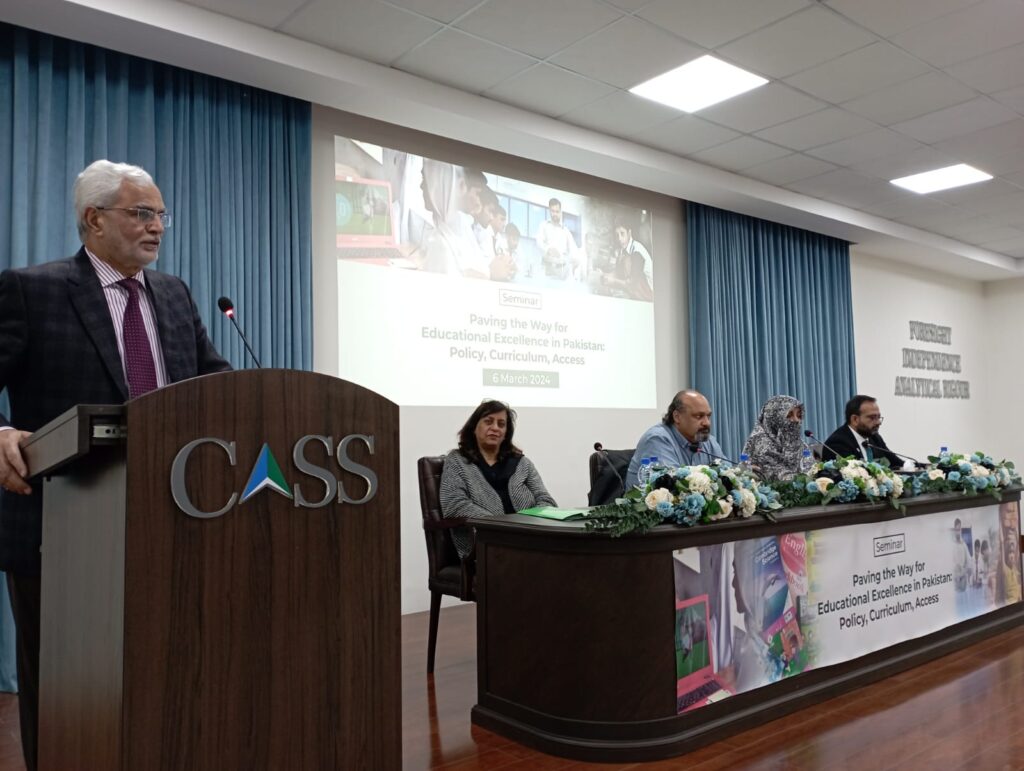The Centre for Aerospace & Security Studies (CASS), Islamabad successfully hosted a pivotal seminar titled ‘Paving the Way for Educational Excellence in Pakistan: Policy, Curriculum, Access.’ The seminar brought together esteemed speakers including Dr Faisal Bari, Dean, LUMS School of Education at the Lahore University of Management Sciences; Ms Mahrin Iqbal Siddiqui, CEO International Foundation for Education, Empowerment and Learning (iFEEL); and Dr Saima Ashraf Kayani, Chairperson Department of International Relations at Fatima Jinnah Women University. The proceedings were moderated by Air Vice Marshal Nasser ul Haq Wyne (Retd), Director Non-Traditional Security at CASS, with a vote of thanks and concluding remarks delivered by Air Marshal Farhat Hussain Khan (Retd), President of CASS.
The seminar addressed key issues including the quality of education and challenges in higher education; out-of-school children and regional disparities and curriculum development. It also offered a platform to discuss the effects of the 18th Amendment on education policies, the viability of a unified syllabus, and the practicality of maintaining distinct educational streams in Pakistan’s diverse landscape.
Introducing the seminar, Air Vice Marshal Nasser ul Haq Wyne emphasised the cumulative impact of neglecting education, noting Pakistan’s significant lag in achieving primary and secondary education targets and the challenges facing the higher education sector, including political interference and insufficient resources; obstructing the nation’s pursuit of developing a comprehensive, skilled workforce and significantly limiting the educational sector’s contribution to national development.
In his address, Dr Faisal Bari highlighted critical issues within Pakistan’s education system, pointing out the nation’s significant struggle to foster critical thinking skills, such as thoughtfulness, judiciousness, the ability to embrace ambiguity, and the capacity for evidence-based reasoning. Discussing the transformative role of technology in higher education, particularly in the context of a new wave of automation, he warned of the potential for Artificial Intelligence (AI) to automate and eliminate numerous jobs, underscoring the urgency for educational reform. He further argued that the future of Pakistan hinges on its education system. Dr Bari stressed the need for substantial improvements at the school level, specifically in pedagogy and curriculum development and called for holistic strategies to incentivise and regulate universities, ensuring they are aligned with the evolving demands of the workforce and the broader society.
Speaking on the subject of ‘Out-of-School Children and Regional Disparities’, Ms Mahrin Iqbal Siddiqui shared that the existing educational infrastructure in Pakistan was insufficient to support the inclusion of its 26 million out-of-school children. Ms Siddiqui stressed the urgent need to launch an education campaign with the same intensity and urgency as the response to the COVID crisis, highlighting the potential of community mosques to play a significant role in raising awareness and sensitizing the populace about the importance of education. She advocated for educational organisations to form partnerships with leading universities across Pakistan, suggesting that such collaborations could significantly enhance children’s opportunities for higher education. Additionally, Ms. Siddiqui pointed out the necessity to bridge the gaps between formal, informal, and hybrid modes of education, ensuring a more cohesive and accessible learning environment for all. She proposed a simple yet effective approach of ‘one room-one subject-one teacher’ to address complex educational challenges.
In addressing the controversies surrounding curriculum content, Dr Saima Ashraf Kayani highlighted the necessity of removing political biases from the curriculum development process to better meet the changing needs of a dynamic society. She underscored the importance of implementing measures to ensure the curriculum is inclusive, relevant, and fosters critical thinking, while also respecting Pakistan’s diverse cultural and regional backgrounds. In her final remarks, Dr Kayani advocated for a strategic revision of the education system, aiming to make it more reflective of and responsive to the country’s complex identity and future needs.
In his concluding remarks, President CASS Air Marshal Farhat Hussain Khan underscored the profound impact of education on national security, spanning both traditional and non-traditional realms. ‘If we want to ensure our security, it is imperative to bring our out-of-school children into the educational fold,’ he stated. President CASS also urged the country’s leadership to transcend short-term electoral interests and invest in policies with benefits that may only be realised over time. He reinforced that educating (tarbiyat) was a collective responsibility of teachers, parents, and society.
The seminar witnessed active participation from a diverse audience, including retired military officers, academics, and students, who engaged in a candid Question and Answer session, enriching the discussion on this crucial issue.


























